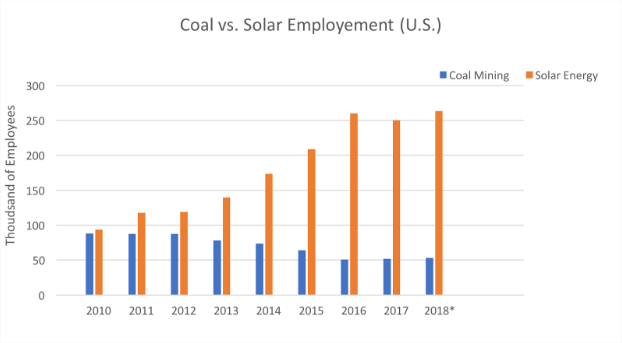
Written by Marc Yaggi, Executive Director, and Arielle Chaifetz, Intern
The coal industry produces the number one source of toxic waste dumped into U.S. waterways and is a primary driver of climate change chaos. If those facts aren’t reason enough to end our reliance on coal, consider clean energy’s role in job creation. The massive growth of clean energy jobs in the United States and around the world is groundbreaking. According to U.S. Department of Energy, roughly 1 million Americans are working near- or full-time in the energy efficiency, solar, wind, and alternative vehicles sectors—five times the current employment in the fossil fuel electric industry, which includes coal, gas, and oil workers. Such growth makes clear that President Trump and many other elected officials are entirely beholden to fossil fuel barons and their greed—all at the expense of the American worker and our economic prosperity. Moreover, it demonstrates that Donald Trump lacks the vision to position the United States as a leader for the future.
Despite the clear market for jobs in the clean energy sector, Donald Trump’s “Energy Dominance” agenda promised Americans a rise in coal mining jobs. For reasons that only can be explained by his serving as a fossil fuel industry puppet while simultaneously engaging in nostalgic chicanery, Trump has tried to prevent coal-fired power plants from closing. But due to clean energy’s popularity and its staggering economic breakthroughs, Trump’s campaign rhetoric failed. In fact, 27 coal-fired plants closed in 2017, roughly 1 every 15 days since Trump’s election.
This is not a recent development: U.S. coal mining jobs have been declining over the past 30 years, from 150,000 jobs in 1987 to 51,000 jobs in 2017, while solar jobs have been growing dramatically. Former and current coal miners deserve jobs and financial security, but with the instability of the coal industry today, they will not find either in their current occupation.

U.S. Bureau of Labor Statistics, All Employees: Mining and Logging: Coal Mining, retrieved from FRED, Federal Reserve Bank of St. Louis; https://fred.stlouisfed.org/series/CEU1021210001, July 19, 2018. “National Solar Jobs Census.” The Solar Foundation, Cornell University ILR School, Oct. 2010, www.thesolarfoundation.org/national/. *This estimation was produced by the Solar Foundation’s Census survey data
Coal’s decline is not limited to the United States. Coal India, the world’s largest coal producer, has cut its workforce by 36 percent since 2002. In the EU, coal production has been falling for the past three decades. In fact, 2016 marked the lowest point of demand for coal-fired energy in the EU: 47.5 % less than in 1990.
Today, the energy market is controlled by consumer demand and a push for clean, sustainable sources. Consumers want to “go green” both to save money and preserve their children’s and grandchildren’s future on this planet. Many large utilities recognize the myriad benefits of moving to clean energy and are converting from dirty fossil fuels to renewables, such as solar and wind. For instance, France’s leading energy company, EDF, committed to investing $25 billion in solar energy to hasten its transition to renewables. Orsted, previously known as DONG (Danish Oil and Natural Gas) sold its oil and gas business in 2017 while developing 25% of the world’s offshore wind capacity. As a result of these investments and other transitions, there are now more than 10 million jobs in the renewable energy sector worldwide.
Certainly, the very future of our planet is the paramount reason to ditch coal. People also want good jobs; clean energy provides them. It is time to take the coal industry off of life support and invest in a future full of clean air, clean water, clean energy, and good jobs. You can help speed up this process in a number of ways:
- If your local and state officials are puppets for the coal industry or are not taking aggressive action to address climate change, change your politician. Election season is upon us, so be sure to get educated, get out and vote.
- You can change your energy source. One thing you can do is add solar to your home. There are solar providers available in many communities. Many of these providers can give you a free estimate, help secure financing, or possibly a lease for solar on your home. Also, EnergySage can be a helpful resource for information about solar.
- If you don’t have the ability to add solar to your home, you can switch your energy provider to an energy service company (ESCO) that uses clean energy. Our partner Arcadia Power provides a free clean energy program by finding you the lowest prices for sourcing clean energy in your area. Sign up here and support Waterkeeper Alliance along the way.
- Support your local Waterkeeper Organization or Affiliate, many of whom are involved in fighting against fossil fuel pollution. You can find your local Waterkeeper group here.
And, of course, conserve energy! Turn off lights, change your light bulbs, and take other conservation and efficiency measures.